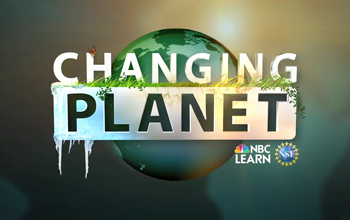News Release 11-245
The Weather Channel to Air "Changing Planet" Town Hall on the Future of Water
Town hall to air on November 16 at 6 P.M. EST; Entire "Changing Planet" series on climate change impacts to air in November

NBC News' Anne Thompson moderates "Changing Planet" town hall meeting at Arizona State Uni
November 14, 2011
This material is available primarily for archival purposes. Telephone numbers or other contact information may be out of date; please see current contact information at media contacts.
The Weather Channel will show the town hall "Changing Planet: Adapting to Our Water Future" on Wednesday, November 16 at 6 p.m. EST.
In the town hall, taped at Arizona State University (ASU) in August, a panel of scientists and local and national policymakers addressed the impacts of climate change, land use and other factors on the nation's water resources.
The town hall is the last in a three-part series produced under a partnership among the National Science Foundation (NSF); NBC Learn, the educational arm of NBC News and Discover magazine. The "Changing Planet" series is intended to encourage student learning and open a dialogue about climate change by gathering scientists, thought leaders, business people, and university students to discuss climate change science, impacts and potential solutions.
NBC News Chief Environmental Affairs Correspondent Anne Thompson moderated the Arizona event, which is being aired as part of NBCUniversal's "Green Is Universal" week.
"We face great challenges now, and in the years and decades ahead when it comes to water-including its scarcity and its purity," said Thompson. "It is important that we have these kinds of discussions about how we can work together to protect and conserve one of our world's most important resources."
This edition of "Changing Planet" brought together more than 400 students in the live audience and features four leading experts from science, academia and politics: Bill Richardson, former Governor of New Mexico; Grady Gammage, Jr., senior sustainability scholar with the ASU Global Institute of Sustainability and senior research fellow with the ASU Morrison Institute for Public Policy; Pat Mulroy, general manager of the Southern Nevada Water Authority; and Heidi Cullen, former climate expert for The Weather Channel and current research scientist and correspondent with "Climate Central."
The Weather Channel will also present encore broadcasts of the first two "Changing Planet" town halls during "Green Is Universal" week. "Changing Planet: Our Lives," moderated by Tom Brokaw and hosted by Yale University, will air on Monday, Nov. 14 at 6 p.m. EST. "Changing Planet: Clean Energy, Green Jobs, and Global Competition," moderated by Anne Thompson and hosted by George Washington University, will air on Friday, Nov. 18 at 6 p.m. EST.
In addition to the town halls, NSF and NBC Learn recently added five new reports to its 17-part "Changing Planet" video series, which looks at the impacts of climate change in various locations and on a variety of species. New titles include:
- Disappearing Lizards
- Survival of Trees
- Bark Beetle Outbreaks
- Grapevines and Drought
- Changing Mosquito Genes
Designed for use in the classroom, each report is correlated to state education standards and includes a lesson plan with activities created by the "Windows to the Universe" project team at the National Earth Science Teachers Association. The videos are available on the Science360, NBC Learn, and Windows to the Universe websites, and are available for widespread broadcast and digital distribution.
-NSF-
Media Contacts
Bobbie Mixon, NSF, (703) 292-8485, email: bmixon@nsf.gov
Meghan Pianta, NBC News, (212) 664-2364, email: meghan.pianta@nbcuni.com
The U.S. National Science Foundation propels the nation forward by advancing fundamental research in all fields of science and engineering. NSF supports research and people by providing facilities, instruments and funding to support their ingenuity and sustain the U.S. as a global leader in research and innovation. With a fiscal year 2023 budget of $9.5 billion, NSF funds reach all 50 states through grants to nearly 2,000 colleges, universities and institutions. Each year, NSF receives more than 40,000 competitive proposals and makes about 11,000 new awards. Those awards include support for cooperative research with industry, Arctic and Antarctic research and operations, and U.S. participation in international scientific efforts.
Connect with us online
NSF website: nsf.gov
NSF News: nsf.gov/news
For News Media: nsf.gov/news/newsroom
Statistics: nsf.gov/statistics/
Awards database: nsf.gov/awardsearch/
Follow us on social
Twitter: twitter.com/NSF
Facebook: facebook.com/US.NSF
Instagram: instagram.com/nsfgov


